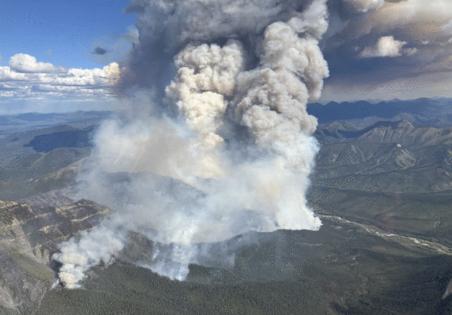Michigan develops website to help people prepare for, stay safe from wildfire smoke
Published in News & Features
The Michigan Department of Environment, Great Lakes, and Energy launched an online resource to help Michiganians understand, prepare for and deal with wildfire smoke.
Smoke from Canadian wildfires has blanketed Michigan this summer, prompting state air quality meteorologists to issue a warning on 31 days for at least part of Michigan. In 2023, there were fewer warnings issued but the concentrations of smoke were higher.
The state's new webpage, Michigan.gov/EGLEWildfireSmoke, includes links to the MiAir tool that shows air quality readings at state air monitors, a signup page for the state's air quality notification system and answers to common wildfire questions.
Exposure to wildfire smoke is dangerous for people's health. The smoke is made of very small particles, some of which can get into people's lungs and bloodstreams.
The U.S. Centers for Disease Control and Prevention said particulate matter exposure can cause coughing, difficulty breathing, irregular heartbeats, asthma attacks and more. University of Michigan researchers also linked wildfire smoke exposure to dementia.
Children, adults over 60 and people with lung or heart disease are most at risk of exposure. Pregnancy and working outdoors also increases risk.
While people can't control wildfire smoke that drifts into their communities, they can take steps to protect themselves from exposure, EGLE said.
For instance, people can try to stay indoors when wildfire smoke is present, or can wear an N-95 mask while outdoors to avoid inhaling the pollutant. They can avoid exercising outdoors when air quality is bad.
To keep indoor air safe, they can use window air conditioning units on the "recirculate" setting or run forced air systems on "fan" or "cooling" settings, EGLE said.
People also can limit outdoor activities like campfires or running gas-powered vehicles or limit the indoor use of gas-powered appliances to limit exposure to particle pollution, EGLE said.
Climate scientists say Canadian wildfires will continue as humans continue to use fossil fuels that release greenhouse gases and warm the atmosphere. Climate change causes hotter, dryer conditions that make wildfires more likely.
Good wildfire management can help, but it's expensive and difficult in the remote regions of northern Canada.
EGLE has three meteorologists who develop air quality forecasts for particulate matter pollution and ozone pollution, EGLE said in a press release about its new website. They use weather models to make their predictions and share their forecasts with the National Weather Service and news media.
They categorize air quality as good, unhealthy for sensitive groups, unhealthy, very unhealthy or hazardous. They issue advisories when forecasts say air quality will be unhealthy for sensitive groups. They issue warnings when they predict it will be worse.
________
©2025 www.detroitnews.com. Visit at detroitnews.com. Distributed by Tribune Content Agency, LLC.







Comments